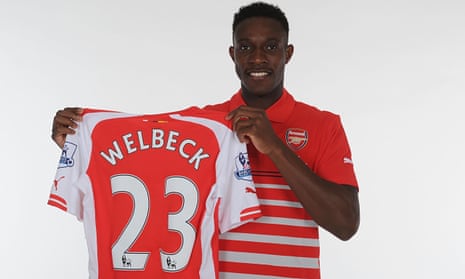There is always a tinge of sadness when any footballer leaves his boyhood club, not least at a time in the Premier League when young English players aren’t so much nurtured gently to maturity as yanked squealing into the light and then hurled beneath the wheels of the machine at the first downward wrench of the gears.
Danny Welbeck may have been heading towards the exit at Manchester United for some time now, a beautifully willing high-pedigree athlete who seems to have been haring off down the same blind alley – knees high, teeth gritted, gloved fists pumping – for pretty much the past two years. But his departure is still a poignant moment for a player who grew up three miles from Old Trafford and who rose through the age groups as a favoured son at every level.
For all that, Welbeck’s £16m move to Arsenal still feels like a cause for cautious optimism for a genuine, if rather ill-defined attacking talent. At the very least it provides a merciful full stop on a period of profound deceleration since the false summit of the summer of 2012, when he capped his best season to date with a memorable back-heel scuff-flick winner against Sweden in Kiev, the high point of England’s most energetic half-hour of an otherwise moribund European Championship. If Welbeck wasn’t exactly flying at that point he was at least – still aged just 21 – thrumming eagerly on the runway.
And yet the past two years have brought little more than a sense of energetic congealment. Indeed the gallows humorist might note that there is something very fitting in Arsenal spending deadline day snapping up a centre-forward whose last goal came at the start of March; that a club who require a razor edge have signed an attacker who resembles more a very useful set of socket spanners; and that above all Welbeck is a signing to maintain the status quo, a player of the second rank for a club happy to remain, profitably, within that bracket. For Arsenal this was meant to be a time of feast not famine. Instead, led in by the elbow, blindfold whipped away, the club’s supporters have been presented with something that looks a bit more like a takeaway in front of the telly.
Which is, of course, to do Welbeck and Arsène Wenger a disservice. Most obviously Welbeck’s arrival has a great deal of simple good sense about it. Take the best bits of Yaya Sanogo and Olivier Giroud – pace and agility; decent all-round finishing – slather them together with papier-mache and chicken wire and you might get something that looks a bit like a Danny Welbeck, a player who will run and finish at least some of the time, rather than doing only one of these all of the time. A team of princely little conductors finally has somebody more obviously qualified to clash the cymbals at the end of its orchestral embroidering. And all this for just £16m: half an Andy Carroll; one and a half Ross McCormacks; a Balotelli.
This is the thing about Welbeck. He is still young enough and gifted enough – just about – to be a genuine contender. Here is a player who appears at times to have it all: team man, lovely mover, scores all kinds of goals, uncowed by the big occasion for England and Manchester United. And who at others seems to be playing all the right notes, but somehow never in the right order. There is a case that Welbeck simply needs the extended run as a first-choice centre-forward that he only ever really had on loan at Sunderland.
Beyond this that he is in his own way a victim of circumstance, an under-finished finisher who simply needs a little overdue affectionate maintenance. English football has long had a reputation for mishandling unusual attacking talent but in recent years it has also shown an ability to mistreat the more meat-and-potatoes centre-forward. Roy Hodgson has talked about his love of the “polyvalent” attacker, those galloping utility forwards able to fill in and track back and play as half a winger, half a striker and, often, not much of either. Welbeck has been perhaps the definitive example of the forward-scuffler, the player who does everything, willingly, except perhaps what he really ought to be doing.
There is even an argument Welbeck is one of those damaged by the fallout from that final, and in retrospect rather toxic, Ferguson-era Premier League title year. With Welbeck relegated to the role of secondary hustler in a team sustained by the arrival of Robin van Persie, 2012-13 was the season his progress as a goalscorer stalled decisively. Famously he scored just once in his last 29 matches, although that one came at a telling moment as Welbeck gave a superbly athletic and intelligent display at the Bernabéu as a kind of anti-regista player who can go anywhere so long as it involves spoiling and snapping and protecting the ball in tight defensive areas.
It is easy to understate how much practice and basic footballing intelligence goes into learning these skills; and also to wonder how much more Welbeck might have benefited from spending all that time and effort on the pitch and in training just focusing on how to be a better centre-forward.
What next, then, for Welbz? It has been suggested he might be Arsenal’s Sturridge, a player who simply needed to feel himself in the embrace of a team where he is an undoubted first choice as central striker. It is a comparison that goes only so far. They are different players: Sturridge is above all a finisher, a player of fine craft in front of goal who looks in retrospect even more of a mismatch as a utility winger. During his extended Premier League adolescence it was Sturridge’s commitment that was questioned. With Welbeck it is simply his ability to press on, to prove his bona fides as a consistent high-level finisher.
In this respect a better role model for Welbeck 2.0 would be Diego Costa, who is just two years older and who had a huge developmental surge at the same stage in his career. Costa is the kind of player Welbeck might model himself on stylistically, with similar gifts for disrupting the opposition and playing in every part of the pitch, but who is also a high-class pure centre-forward with a poacher’s finishing skills. No pressure then, Danny.
There is of course no guarantee Welbeck will play as a regular centre-forward at Arsenal. Wenger may prefer Alexis Sánchez, or to see Welbeck as just another in his surfeit of utility forwards. Hopefully not, though. Welbeck deserves, at the very least, the chance to fail properly as a centre-forward, while from Arsenal’s perspective the more notable goalscorers in recent Premier League seasons have often tended to be sensibly priced hunches rather than top-dollar sure things. Much will depend on how well he starts. But there is still a decent chance that in Welbeck – still English football’s most vaguely promising 23-year-old non-scoring goalscorer – Wenger may just end up stumbling across another.

